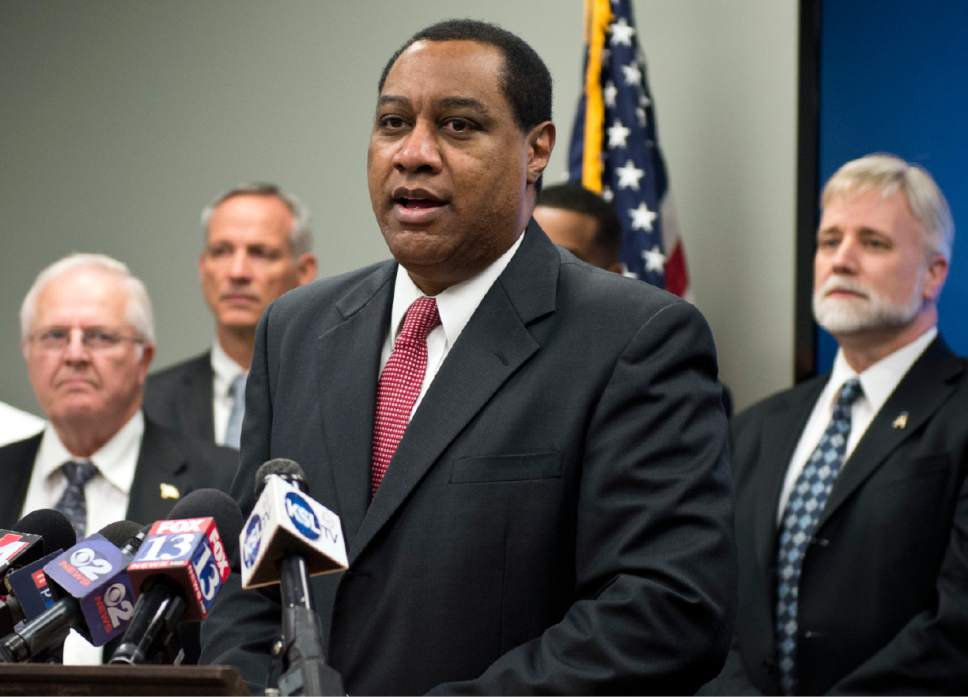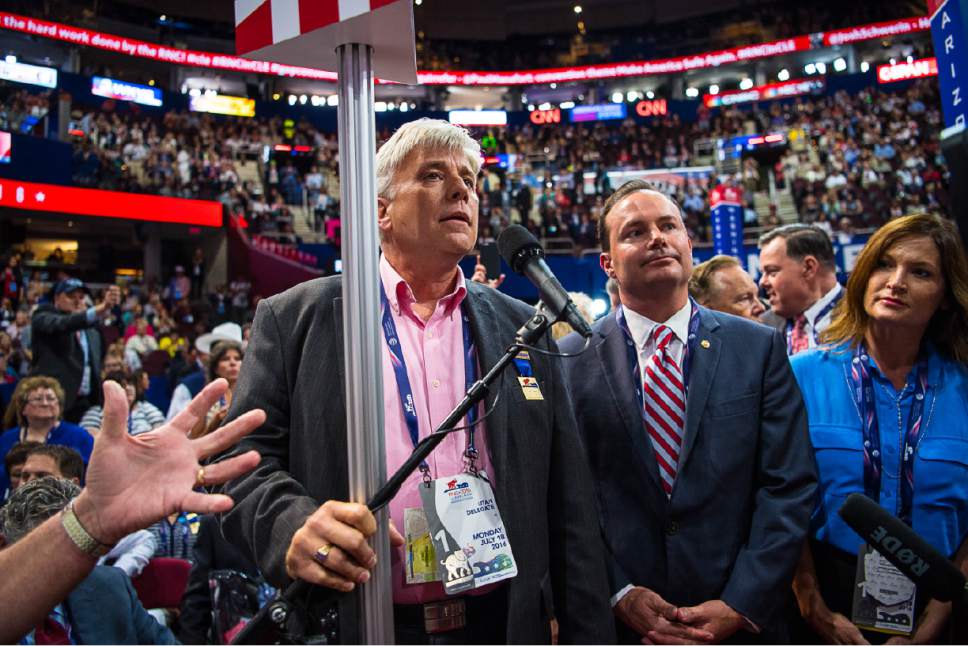This is an archived article that was published on sltrib.com in 2017, and information in the article may be outdated. It is provided only for personal research purposes and may not be reprinted.
This year's race for Utah Republican Party chairman hinges largely on shades of difference about how each of three candidates plans to fight a new law they all dislike, Senate Bill 54.
That law allows candidates to sidestep the party's caucus-convention system and qualify for the primary ballot by collecting signatures instead — weakening the power of delegates and party leaders.
Party Chairman James Evans, who is seeking re-election, pushed the ongoing lawsuits against SB54 and says the $300,000 debt they created so far is no big deal. But he says that should not be the main focus of the party, which he says needs to continue electing Republicans.
Vice Chairman Phill Wright says the party must continue fighting to defend the caucus-convention system to keep GOP pretenders off the ballot and allow less-wealthy candidates better chances of winning. But he says the lawsuit debt hurts party fundraising, and he wants to form a private group to raise legal funds.
Davis County Party Chairman Robert Anderson says SB54 is flawed but questions the wisdom of continuing lawsuits against it — which the party has lost at every point so far. He says it may be wiser to focus more on legislative and political solutions.
Party delegates will elect a new chairman at their state convention May 20 in Sandy.
—
SB54 • None of the three candidates likes SB54, a compromise reached when the Count My Vote ballot initiative sought to replace the caucus-convention system with an open primary in a bid to loosen the grip of conservative delegates on the party nomination.
SB54 is a hybrid that allows the caucus-convention system and collecting signatures to qualify for the primary.
"SB54 takes away the ability of an average person to compete against a wealthy person," Wright said. He adds that the caucus-convention system allows a poor person to compete by targeting a few delegates personally.
Open primaries, he contends, heavily favor wealthy candidates who can buy more advertising. "The caucus-convention system allows the person to win who has the best ideas, not the biggest wallet."
Also in conservative Utah, he says some candidates figure the best way to be elected is to claim to be Republican — even if they aren't. "Delegates are able to truly vet candidates and find that out" and reject Republicans-in-name only, Wright said.
So he favors continuing legal appeals challenging SB54. These lawsuits have created a $308,000 debt for the party.
Evans initiated those lawsuits at the direction of the GOP state central committee. He says party leadership is more than pushing the one issue against SB54.
"If we don't have a strong, vibrant party, these other discussions are meaningless," he said.
So Evans said his primary goal is always to help elect Republicans to office — but also seeks to "protect what has worked for decades, which is the caucus-convention system."
He seeks a third term, Evans said, "to complete the heavy lift that we started back in 2013 to make sure the party is in a great position," and that includes seeing the SB54 lawsuit through to completion. He blames SB54 supporters for hurting the party and its fundraising ability by making false claims about debt.
Evans claims Anderson has supported moderates who support open primaries, but Anderson denies having any connections to the Count My Vote-backers.
He called SB54 "flawed legislation" that was hurriedly passed and left GOP delegates out of the conversation. What remains, he said, is a process that eliminates much of the candidate vetting and grassroots involvement that is critical to democracy.
"It weakens all political parties in general," Anderson said. "More citizen involvement is always better."
Whether to continue to appeal SB54 is a decision that Anderson said rests with the state central committee, but he said he questions the wisdom of involving the federal appeals court in what is an issue of state rights vs. individual rights.
"I'm also concerned that if the Utah GOP loses these appeals, any attempts to readdress Utah's election law subsequent to SB54 will be forfeited," he said. "I would very much like to bring all parties back to the table before it's too late to do so."
—
Debt • Another dividing point is how to handle debt created by the SB54 lawsuit and how it has disrupted other party fundraising.
Evans says attorneys have run up unpaid, billable charges of $308,000. Critics falsely claim that has the party teetering on bankruptcy, Evans said, leading many who dislike the lawsuit not to contribute to the party, worrying their donations could go toward legal bills.
Such concerns have dampened overall party donations and have its operations just barely in the black.
Evans presents letters from lawyers saying they agreed that the GOP may satisfy outstanding bills with funds "as they are raised and received by the party." He says these letters show there is no danger of bankruptcy and demonstrate his skill at negotiating.
"I don't know how many people you know that are able to negotiate with attorneys and get them to carry that kind of debt, but that's what I had to do to make this happen," Evans said.
Wright says Evans acts "like a party of one" on such matters and doesn't involve other party officers enough. "James says he wants to continue to do heavy lifting. But many hands make heavy lifting easier. ... I think the most important thing a leader can do is involve people."
Evans currently has the party asking donors to clarify if they want donations to go to the SB54 lawsuit or to party operations.
Wright says he would like to create a private group to receive donations for the lawsuit and thereby eliminate concerns that the party is using contributions in ways donors do not approve.
Evans said he is looking at increasing party funds by selling advertising to friendly businesses in its newsletter and convention program.
Anderson said he would use a values message to lobby party donors to help get the bills paid.
"It is not, nor will it ever be, a conservative value to use someone's services without proper compensation," he said. "This debt needs to be paid."
To further draw donors back, Anderson said, the party needs to show greater fiscal responsibility. First among the changes he'd make, Anderson said, would be to draft an operating budget for the party, conduct an audit and develop a clear plan for future expenditures.
"There is a need for transparency," he said. "Once you can show potential donors the intended use of all funds, I believe they will again begin to contribute."
—
Experience • The three candidates all have served in a variety of party leadership positions through the years.
Evans, 53, is a former state senator who has served as the state party chairman for four years. He was previously chairman of the Salt Lake County GOP for four years and served on a variety of state and county GOP committees.
He said his achievements as party chairman include helping Republicans win a congressional seat that had been held by Democrat Jim Matheson; winning all major state and federal offices in Utah; helping Donald Trump win a tightly contested general election in Utah; and "having the highest turnout ever" in party caucuses during the presidential election.
Evans said he just sold his Chekline payday loan chain and is looking at other investments. He is a chemical engineer and a former Air Force officer. A native of South Carolina, he has lived in Utah since 1994.
Wright, 56, has been the state vice chairman for two years and is the former Davis County Republican chairman. He said a major goal if he wins would be to target Utah's large bloc of unaffiliated voters.
"We have 715,000 registered Republicans. But the state has 600,000 independents," he said. "We need to get our message out and [be] more clear and accurate so we win more independents."
Wright works for a credit union. A native of California, he has lived in Utah since 1997.
A retired Air National Guard Lt. Colonel, Anderson, 51, is the outgoing chairman of the Davis County GOP. He defeated Wright for the post in 2015, a year after the county party's vice chairman and secretary — Anderson's wife, Kathleen — quit due to a contentious environment and Wright's heavy-handed leadership style.
Anderson, who flew F15s for 22 years and is now a commercial airline pilot, said he gave the county party its first budget in seven years and helped draw in donors. That's left Davis County with a "robust" budget that outpaces the financial resources of Salt Lake and other counties, the Wyoming native said.
If he's elected, another major focus of an Anderson administration would be to provide services and support to county parties statewide, including championing efforts to make the caucus-convention system the preferred route to the ballot and providing training that ensured more effective caucus meetings.
The party should also provide Federal Election Commission compliant database management for registered Republicans, caucus attendees and delegates and ensure that statewide plans for caucus night preparations are completed well in advance.
"I consider myself an underdog," said Anderson, a father of eight who has lived in Utah since 2006. "But if you truly consider the issues and the situation, I have the leadership skills for this and I know how to get things done.





